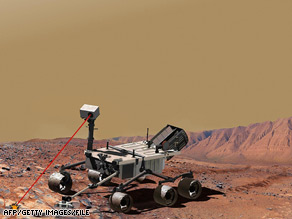WASHINGTON (CNN) — NASA officials announced on Thursday that the launch of the Mars Science Laboratory will be delayed until the fall of 2011 due to technical difficulties and cost overruns.
Initially scheduled for launch in the fall of 2009, the Mars Science Lab is a large rover powered by nuclear energy and equipped with a suite of scientific instruments. It is part of NASA’s long-term robotic exploration effort to study the early environmental history of Mars and determine if the planet can sustain life.
According to NASA, the delay is attributed to testing and hardware challenges that still need to be addressed to ensure a successful mission.
“The progress in recent weeks has not come fast enough on solving technical challenges and pulling hardware together,” said Charles Elachi, director of NASA’s Jet Propulsion Laboratory.
NASA Associate Administrator Ed Weiler argued that rescheduling for a 2011 launch will allow for careful resolution of technical problems, thorough testing, and avoid rushing the launch.
The projected cost of the Mars Science Lab is now approximately $2.1 billion, compared to the original price tag of $1.6 billion. NASA’s budget for the current fiscal year is around $15 billion.
The Mars rover will incorporate new technologies and be designed to explore greater distances and rougher terrain than previous missions to the planet, including a new surface propulsion system.
“Failure is not an option on this mission,” Weiler emphasized. “The science is too important and the investment of American taxpayer dollars compels us to be absolutely certain that we have done everything possible to ensure the success of this flagship planetary mission.”
Weiler stated that additional costs resulting from the delay will not lead to the cancellation of other NASA programs, although there may be some program delays.
Critics believe that the delay and cost overruns of the Mars Science Lab highlight a lack of accountability and inefficiency in NASA’s management of time and taxpayer funds.
“The Mars Science Laboratory is only the latest symptom of a NASA culture that has lost control of spending,” wrote former NASA associate administrator Alan Stern.
NASA spokesperson Dwayne Browne responded by stating that NASA is constantly working to improve cost estimating capabilities and reviewing projects to understand the true risks in terms of performance, cost, and schedule.
NASA’s most recent Mars project, the Phoenix Mars Lander, concluded last month after operating two months beyond its initial three-month mission.
The mission confirmed the presence of water ice in the Martian subsurface, detected small concentrations of salts that could be nutrients for life, and observed snowfall from the clouds, according to NASA.
All About Mars Exploration • NASA












